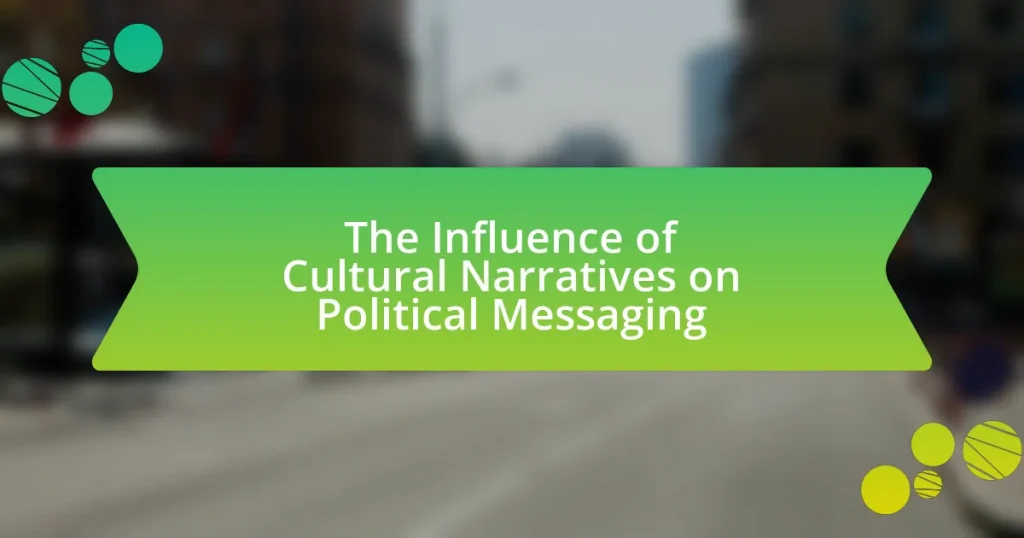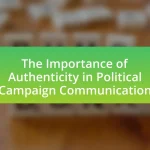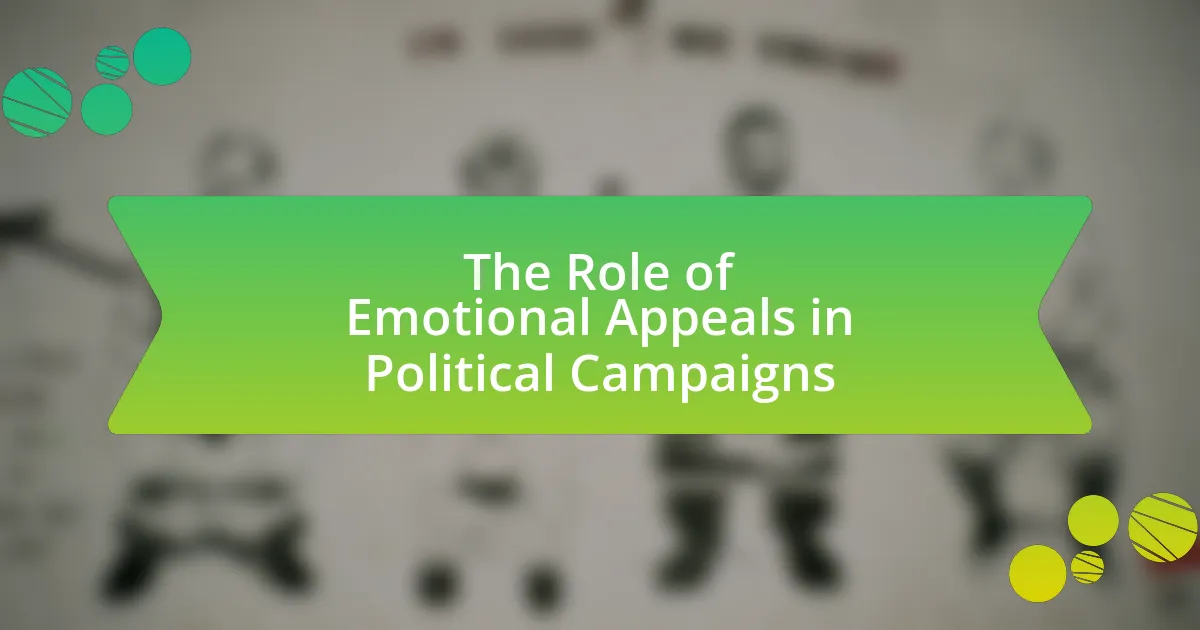Cultural narratives are the shared stories, beliefs, and values that shape community identities and worldviews, playing a significant role in influencing individual behaviors, social norms, and political messaging. This article explores how cultural narratives shape both individual and collective identities, detailing their key elements and evolution over time. It examines the impact of these narratives on public opinion and voter behavior, highlighting their importance in political contexts and the strategies politicians use to align their messages with cultural narratives. Additionally, the article discusses the effects of cultural narratives on policy-making and governance, providing examples of how they shape political landscapes and outcomes across different regions.
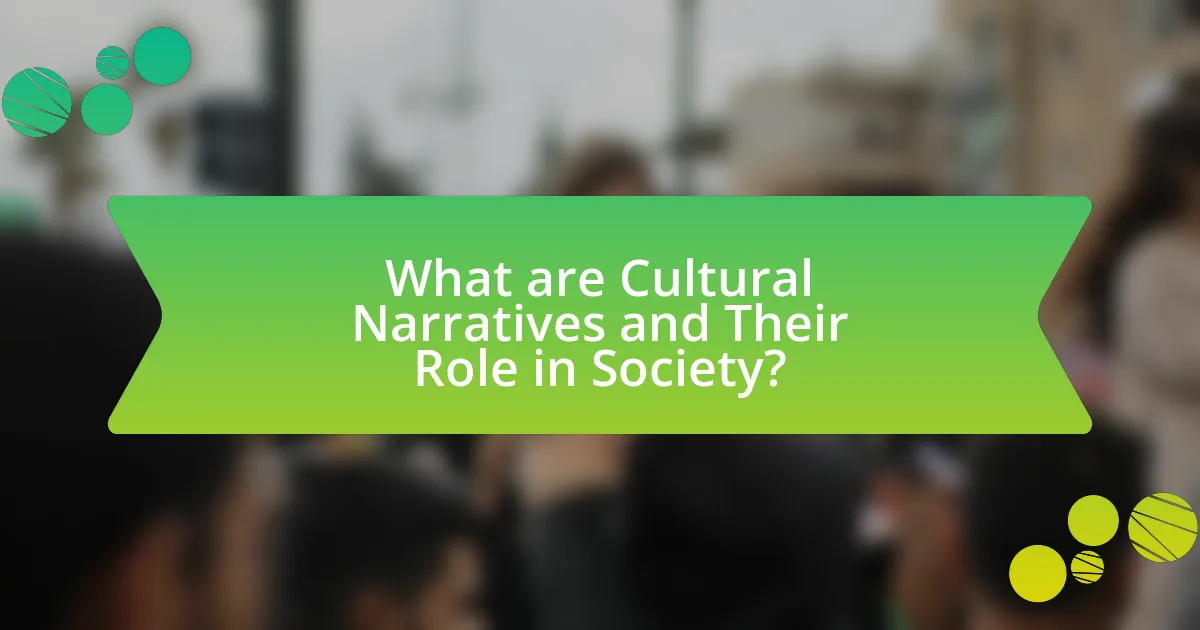
What are Cultural Narratives and Their Role in Society?
Cultural narratives are the shared stories, beliefs, and values that shape a community’s identity and worldview. They play a crucial role in society by influencing individual behaviors, social norms, and collective memory. For instance, cultural narratives can reinforce social cohesion by providing a common framework for understanding experiences and events, as seen in national myths or historical accounts that unite people under a shared identity. Additionally, these narratives can impact political messaging by framing issues in ways that resonate with the public’s values and beliefs, thereby guiding political discourse and decision-making. Research indicates that narratives that align with cultural values are more persuasive, as demonstrated in studies on political communication, where candidates who effectively utilize cultural narratives tend to garner greater support from voters.
How do cultural narratives shape individual and collective identities?
Cultural narratives shape individual and collective identities by providing frameworks through which people interpret their experiences and understand their place in society. These narratives influence values, beliefs, and behaviors, often reflecting shared histories and social norms. For instance, the narrative of the American Dream has historically shaped individual aspirations and collective identity in the United States, promoting ideals of hard work and success. Research by sociologist Arlie Russell Hochschild in “Strangers in Their Own Land” illustrates how cultural narratives can create divisions in identity, as different groups interpret the same narrative in contrasting ways, leading to varied political alignments and social cohesion.
What are the key elements that constitute a cultural narrative?
Key elements that constitute a cultural narrative include shared beliefs, values, symbols, and historical context. Shared beliefs reflect the collective understanding of a community, while values represent what is deemed important within that culture. Symbols serve as representations of these beliefs and values, often manifesting in language, art, or rituals. Historical context provides the background that shapes these narratives, influencing how they evolve over time. For instance, the American Dream narrative encapsulates values of freedom and opportunity, symbolized by the pursuit of happiness, and is rooted in the historical context of immigration and the founding principles of the United States.
How do cultural narratives evolve over time?
Cultural narratives evolve over time through processes of reinterpretation, adaptation, and integration of new experiences and perspectives. These narratives are influenced by social, political, and technological changes, which reshape the context in which they are understood. For example, the narrative surrounding civil rights in the United States has transformed significantly since the 1960s, reflecting shifts in societal values, legal frameworks, and activism. This evolution is evidenced by the increasing recognition of intersectionality in discussions about race and gender, which has expanded the narrative to include diverse voices and experiences. Such changes illustrate how cultural narratives are not static; they are dynamic constructs that respond to the complexities of human experience and societal progress.
Why are cultural narratives significant in political contexts?
Cultural narratives are significant in political contexts because they shape public perception and influence political behavior. These narratives provide a framework through which individuals interpret political events, policies, and candidates, often guiding their beliefs and actions. For instance, during the 2008 U.S. presidential election, narratives around hope and change were pivotal in mobilizing voters and framing Barack Obama’s campaign. Research indicates that narratives resonate more deeply with audiences than mere facts, as they evoke emotions and foster connections, making them a powerful tool for political messaging.
What impact do cultural narratives have on public opinion?
Cultural narratives significantly shape public opinion by framing issues, influencing perceptions, and guiding collective beliefs. These narratives provide context and meaning to social phenomena, often leading individuals to align their views with the dominant storylines prevalent in their culture. For instance, research by the Pew Research Center indicates that narratives surrounding immigration can sway public attitudes, with stories emphasizing personal experiences leading to more empathetic views compared to those focusing on statistics or crime. This demonstrates that the way cultural narratives are constructed and disseminated can directly affect how people interpret and respond to political messages, ultimately shaping societal consensus or division.
How do cultural narratives influence voter behavior?
Cultural narratives significantly influence voter behavior by shaping individuals’ perceptions, values, and decision-making processes. These narratives provide a framework through which voters interpret political messages, often aligning their choices with the stories and symbols that resonate with their cultural identity. For instance, research by the Pew Research Center indicates that voters are more likely to support candidates who reflect their cultural values and narratives, demonstrating that cultural alignment can sway electoral outcomes. Additionally, narratives that evoke strong emotional responses, such as those related to national identity or social justice, can mobilize voter turnout and engagement, further illustrating the power of cultural narratives in shaping political behavior.
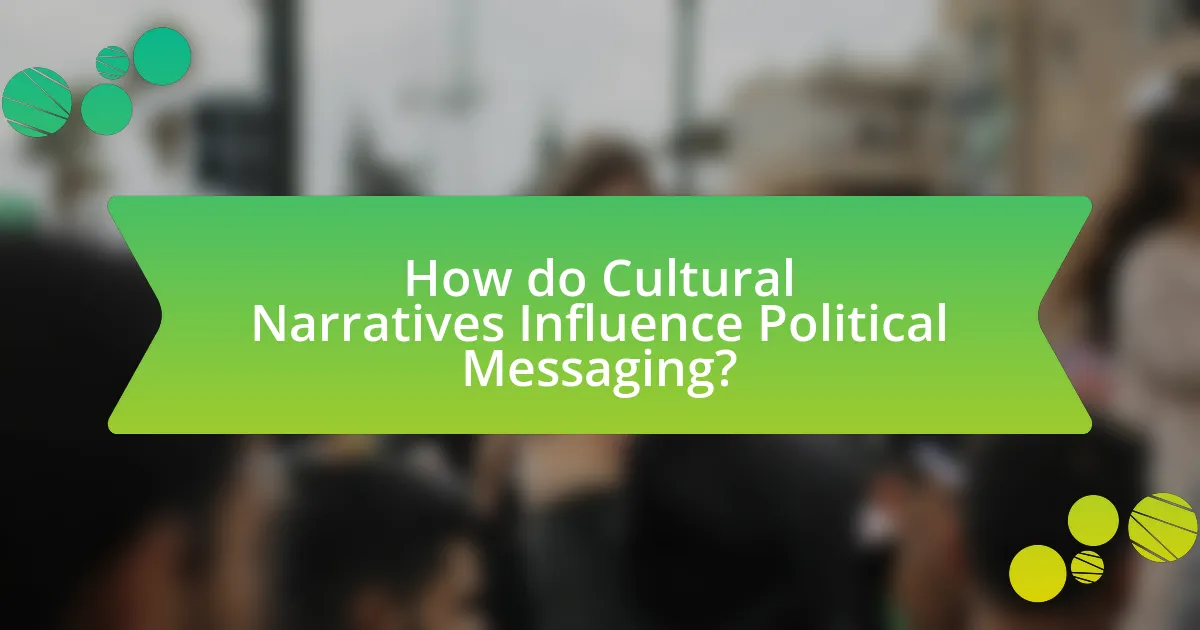
How do Cultural Narratives Influence Political Messaging?
Cultural narratives significantly influence political messaging by shaping the values, beliefs, and identities that resonate with specific audiences. These narratives provide a framework through which political messages are interpreted, often aligning with the cultural context of the target demographic. For instance, political campaigns frequently utilize stories and symbols that reflect the historical experiences and collective memory of a community, thereby enhancing relatability and emotional engagement. Research indicates that messages framed within familiar cultural narratives can lead to increased persuasion and mobilization, as seen in the 2008 U.S. presidential election, where Barack Obama effectively employed narratives of hope and change that resonated with diverse cultural backgrounds. This alignment between cultural narratives and political messaging not only fosters connection but also reinforces the legitimacy of the political message within the cultural context.
What strategies do politicians use to incorporate cultural narratives into their messaging?
Politicians incorporate cultural narratives into their messaging through strategies such as storytelling, symbolism, and appeals to shared values. Storytelling allows politicians to connect emotionally with constituents by framing their policies within relatable narratives that resonate with cultural experiences. For example, Barack Obama often used personal anecdotes to illustrate broader social issues, making his messages more relatable and impactful. Symbolism involves using culturally significant images or references that evoke strong emotional responses; for instance, invoking national symbols like the flag can foster a sense of unity and patriotism. Additionally, politicians appeal to shared values by aligning their messages with the cultural beliefs and norms of their target audience, which can enhance their credibility and relatability. Research indicates that messages that align with cultural narratives are more persuasive, as they tap into the existing beliefs and identities of the audience, making the communication more effective.
How do cultural references enhance political speeches?
Cultural references enhance political speeches by making them more relatable and engaging for the audience. When politicians incorporate familiar cultural elements, such as historical events, popular media, or shared values, they create a connection with listeners that fosters understanding and emotional resonance. For instance, Barack Obama frequently referenced American history and cultural icons in his speeches, which helped to evoke a sense of shared identity and purpose among diverse audiences. This strategy not only captures attention but also reinforces the speaker’s message by framing it within a context that the audience already understands, thereby increasing the likelihood of acceptance and support.
What role does storytelling play in political campaigns?
Storytelling plays a crucial role in political campaigns by shaping narratives that resonate with voters’ emotions and values. Political candidates utilize storytelling to create relatable and compelling messages that can simplify complex issues, making them more accessible to the electorate. For instance, during the 2008 presidential campaign, Barack Obama effectively used personal stories to connect with voters, illustrating his background and vision for America, which contributed to his appeal and eventual victory. Research indicates that narratives can significantly influence public opinion, as they help individuals process information and form connections with candidates, thereby enhancing voter engagement and support.
Why is it important for political messages to resonate with cultural narratives?
Political messages must resonate with cultural narratives to effectively engage and mobilize the target audience. When political messages align with the values, beliefs, and experiences embedded in cultural narratives, they become more relatable and persuasive. Research indicates that messages that reflect cultural contexts are more likely to be accepted and acted upon by individuals, as they tap into shared identities and collective memories. For instance, political campaigns that incorporate local traditions or historical references often see increased voter turnout, demonstrating the power of cultural resonance in shaping political behavior.
How do cultural narratives create emotional connections with voters?
Cultural narratives create emotional connections with voters by resonating with their shared values, beliefs, and experiences. These narratives often reflect the collective identity of a community, allowing voters to see themselves represented in political discourse. For instance, during the 2008 U.S. presidential election, Barack Obama’s campaign effectively utilized the narrative of hope and change, which aligned with the aspirations of many voters facing economic challenges. This alignment fostered a sense of belonging and emotional investment in his candidacy. Research indicates that narratives that evoke strong emotions, such as empathy or nostalgia, can significantly influence voter behavior and decision-making, as they create a deeper psychological bond between the voter and the political message.
What are the risks of misaligning political messages with cultural narratives?
Misaligning political messages with cultural narratives risks alienating constituents and undermining trust in political institutions. When political messages do not resonate with the prevailing cultural beliefs and values, they can lead to public disillusionment and disengagement. For instance, a study by the Pew Research Center found that 70% of Americans believe that political leaders should reflect the values of their communities; failure to do so can result in decreased voter turnout and support. Additionally, misalignment can foster polarization, as individuals may gravitate towards alternative narratives that align more closely with their cultural identity, further fragmenting the political landscape.
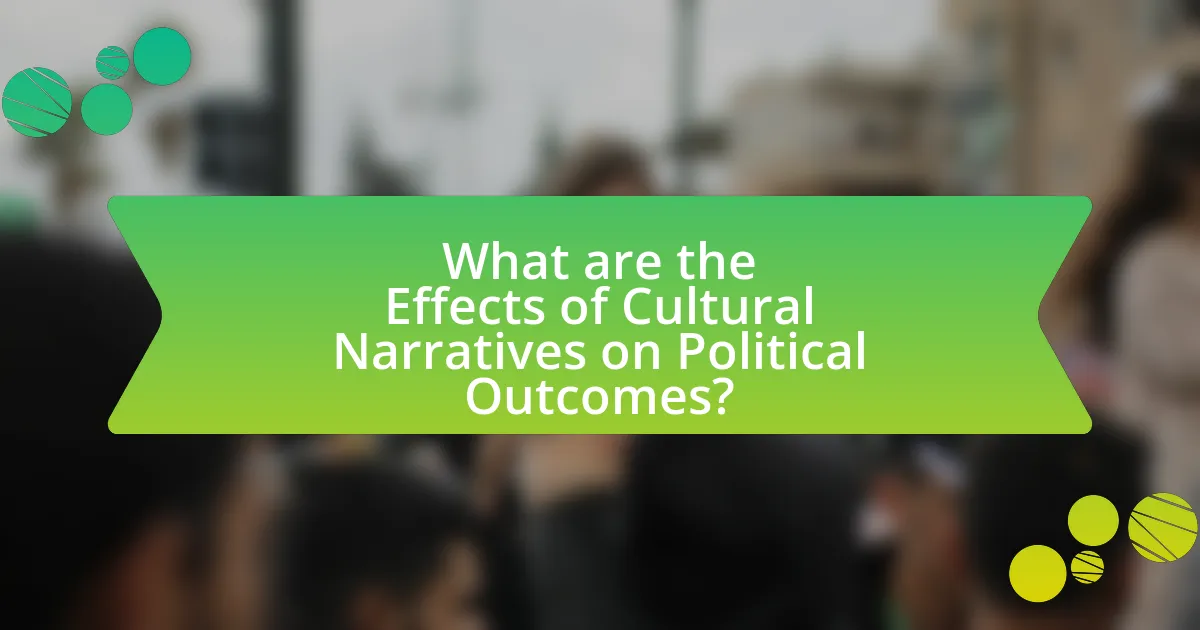
What are the Effects of Cultural Narratives on Political Outcomes?
Cultural narratives significantly shape political outcomes by influencing public perception and voter behavior. These narratives frame issues, create shared identities, and establish norms that guide political discourse. For instance, the narrative surrounding immigration in the United States has led to polarized views, impacting policy decisions and electoral results. Research by the Pew Research Center indicates that narratives emphasizing national security can sway public opinion towards stricter immigration policies, demonstrating how cultural narratives can directly affect legislative outcomes.
How do cultural narratives affect policy-making and governance?
Cultural narratives significantly influence policy-making and governance by shaping public perceptions and values. These narratives provide a framework through which individuals interpret political issues, often guiding the priorities and decisions of policymakers. For instance, in the United States, the narrative surrounding individualism has led to policies that emphasize personal responsibility and limited government intervention, reflecting the cultural belief in self-reliance. Research by the Pew Research Center indicates that cultural values can predict public support for specific policies, demonstrating that narratives rooted in cultural identity can sway legislative outcomes.
What examples illustrate the influence of cultural narratives on specific policies?
Cultural narratives significantly influence policies, as seen in the case of immigration reform in the United States. The narrative framing immigrants as either “job stealers” or “hardworking contributors” has shaped public opinion and legislative actions. For instance, the 2012 Deferred Action for Childhood Arrivals (DACA) policy emerged from a narrative emphasizing the positive contributions of young immigrants, which garnered public support and led to its implementation. Conversely, the narrative surrounding the “border crisis” has influenced stricter immigration policies, such as the 2019 border wall funding. These examples demonstrate how cultural narratives directly impact policy decisions and public perception.
How do cultural narratives shape the political landscape in different regions?
Cultural narratives significantly shape the political landscape in different regions by influencing public perception, identity, and policy priorities. For instance, in the United States, the narrative of the “American Dream” fosters a belief in individualism and economic mobility, impacting political discourse around issues like taxation and social welfare. In contrast, in many Middle Eastern countries, narratives centered on religious identity and historical grievances can drive political movements and influence governance, as seen in the rise of political Islam. These narratives are often reinforced through media, education, and political rhetoric, which further solidifies their impact on regional political dynamics.
What lessons can be learned from the intersection of cultural narratives and political messaging?
The intersection of cultural narratives and political messaging reveals that effective political communication must resonate with the values and beliefs of the target audience. Political messages that align with cultural narratives can enhance relatability and acceptance, as seen in the 2008 U.S. presidential campaign where Barack Obama utilized themes of hope and change that echoed American ideals. This alignment fosters trust and engagement, as evidenced by studies showing that voters are more likely to support candidates whose messages reflect their cultural identities and experiences. Thus, understanding and integrating cultural narratives into political messaging is crucial for successful political campaigns.
How can political communicators effectively leverage cultural narratives?
Political communicators can effectively leverage cultural narratives by aligning their messages with the values and beliefs inherent in those narratives. This alignment enhances relatability and resonance with the target audience, making the communication more impactful. For instance, during the 2008 U.S. presidential election, Barack Obama’s campaign successfully utilized the narrative of hope and change, which resonated deeply with voters seeking a transformative political experience. This strategic use of cultural narratives not only mobilized support but also fostered a sense of community among diverse voter groups, demonstrating the power of culturally relevant messaging in political communication.
What best practices should be followed to ensure alignment with cultural narratives?
To ensure alignment with cultural narratives, organizations should conduct thorough cultural assessments to understand the values, beliefs, and practices of the target audience. This involves engaging with community leaders and stakeholders to gather insights and perspectives that reflect the cultural context. Research indicates that campaigns that resonate with cultural narratives can increase engagement and trust; for example, a study by the Pew Research Center found that culturally relevant messaging significantly enhances the effectiveness of political communication. Additionally, organizations should tailor their messaging to reflect local customs and language, ensuring that it is relatable and authentic to the audience. By integrating these practices, organizations can foster deeper connections and enhance the impact of their political messaging.
